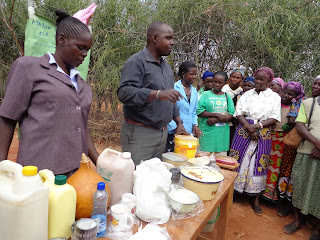Residents of kyuso have been advised to go back to growing of traditional high value crops for economic sustainability.
According to various research in agriculture conducted in Ukambani, particularly in the larger Mwingi
region, Traditional High Value Crops have been identified as the economic crops
in the region. Research by KARI/FAO published under Corporate Document
Repository (FOSA/WP/14) and through the assessment of the agricultural economic
activities of Ukambani’s ASAL, the findings extended credence to the viability
of Traditional High Value Crops.
Traditional food crops such sorghum,
millet, sweet potatoes, cassava, pigeon peas, cowpeas, green grams and dolichos
have been pivotal in ensuring self-sufficiency in food despite being outside
the bracket of other more recognized crops in the agricultural system.
These crops have been neglected for a long time with little support for their research and development. Other factor which have caused decline in production of these crops include ;low interest by Seed Companies to multiply the seeds due to low demand, low investment on research and extension to develop and promote superior varieties, emergence of pests and diseases, limited knowledge on utilization and agro-processing to add value and improve marketability.
The attitude towards these crops is
changing rapidly with the realization that they have enormous potential of ensuring food security
to millions of Kenyans those living in arid and semi-arid lands (ASALs) that
are characterized by recurrent droughts, poor soils and general lack of
resources for meaningful agricultural production. These crops have also been
recognized as important in adapting to climatic change.
Hence the Ministry of Agriculture
together with other sector ministries held a field day on Traditional High
Value Crops production, post harvest handling and marketing to educate, and
promote the crops.
The theme of the field day was “Promotion
of Traditional High Value Crops for Economic Sustainability in Kyuso District”.
The
emphasis of growing such crops as cassava, sorghum,millet amongst were
reinstated during Maseki field day where the guest of honour was the
deputy county commissioner Mr. Peter Maina but represented by his
assistant Mr. Shaaban.



